(5 minutes read)
Reports indicate that conditions imposed by India to restrict rice exports have affected the availability of food articles in African countries like Senegal and the Ivory Coast, where the staple food is rice. These countries import broken rice from India considered being a cheaper variety, that fits into their pocket
Reports indicate that conditions imposed by India to restrict rice exports have affected the availability of food articles in African countries like Senegal and the Ivory Coast, where the staple food is rice. These countries import broken rice from India, considered to be a cheaper variety that fits into their pocket.
The report indicates that India introduced a 20% tax on exports of high-quality rice to improve domestic supplies, as the Asian giant faced shortages due to drought in the rice-producing regions. As India’s export of broken rice dwindled, Senegal recently set a price of 325 CFA francs per kilo (about 0.5 euros) for Indian broken rice. It is one of the cheapest and most widely consumed types of rice. Broken rice is imported into the west African country in large quantities because of its lower prices.
Africa is one of the largest rice-importing regions, accounting for 32% of the world’s imports to feed 13% of the world’s population. There is local production; but it covers only 60% of the requirements and the gap between the local production and requirements is met through imports, mainly from India, whose broken varieties of rice are cheaper and popular in several countries in the region.
India’s decision to limit its exports has come at a time, the Russia-Ukraine war has already disrupted the supply of wheat and other food articles to the continent, which has a huge demand for foodstuffs, mainly because of the abandoning of agriculture with the advent of the hunt for hydrocarbon both offshore and inshore. The shortage of rice, further aggravated the precarious food situation, even leading to panic buying and clashes in some countries. For instance, Comoros, an archipelago where 890,000 inhabitants live, faced acute food shortage, where clashes were reported in September this year. The same was the case with Liberia, where prices of rice soared to 23 euros per 25kg bag, compared to the usual 13 euros. Most of these countries have a per capita daily earning of a worker pegged at Euro 2.
There is a discernible silver line developing amidst this unprecedented food crisis in countries, which are import dependent to meet their domestic requirements. Senegal, for instance, produces some 840,000 tonnes of rice every year, which is enough to meet only nine months’ consumption. To meet the surging demand, the country imports an average of 900,000 tonnes of rice every year to make good the gap between demand and supply and to ensure buffer stocks meet any exigencies.
The perennial shortages and the heavy outgo of foreign exchange forced countries in the region to turn to local cultivation. For instance, Senegal aims at reducing its dependence on imports. By 2030, consumption in Senegal is expected to reach 1.5 million tonnes of rice per year, necessitating heavy imports. The country is presently working on a strategy to raise domestic production. That does not come from the blue. Heavy investments are needed, which is estimated close to Euro 2 billion for creating more rice fields, extending credit to farmers, creating irrigation facilities, etc.
Read Also:
https://trendsnafrica.com/kenya-south-africa-in-talks-to-form-a-pan-african-airline/
https://trendsnafrica.com/reltime-fintech-to-expand-in-southern-africa/
https://trendsnafrica.com/japan-pledges-30bn-development-aid-for-africa/
There are success stories of countries in the region reducing their dependence on imports. For instance, in Côte d’Ivoire where ‘the quantities imported from India have fallen by 24% from 2021 to 2022, indicating a clear shift towards Ivorian rice.





